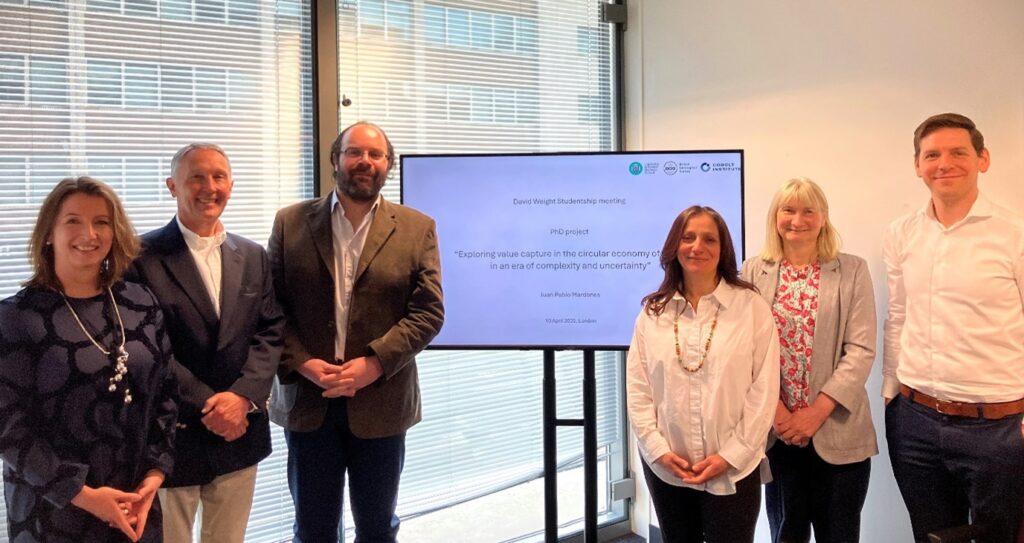Cobalt Institute’s Circular Economy PhD: The Geopolitics of Circularity
As the world enters a new geopolitical age, the race for critical minerals is heating up. Amidst a fracturing of the global critical mineral economy, countries are building more resilient supply chains by considering alternative sources, including secondary critical minerals capacity. But with countries scrambling to secure supply of minerals vital to the energy transition and defence, what does this mean for the cobalt industry? Will the transition to a circular cobalt economy redefine the geopolitical landscape?
To answer these questions, Cobalt Institute is sponsoring a PhD research programme in which candidate Juan Pablo Mardones will seek to answer some of the most pressing questions facing the critical minerals world today. The PhD, a joint research programme between the University of Exeter’s Business School and the British Geological Survey (BGS), and fully funded by Cobalt Institute, will conclude in September 2027.
Exploring Value Capture in the Circular Economy of Cobalt in an Era of Complexity and Uncertainty comes at a critical time for cobalt and the critical minerals space. The research is focusing on the circular cobalt economy, maximising the recapture value from mining tailings and e-waste. At the same time, it is exploring the links between a transition to a circular cobalt economy and geopolitics in the context of an age defined by resource nationalism and an ongoing race to secure domestic supply of cobalt and build recycling capacity.
The research already shows that geopolitical dynamics are increasingly identified as an important factor for organisations, with recycling being singled out as the easiest win for a circular cobalt economy to mitigate geopolitical pressure on the value chain. Despite this increased attention being paid to circularity by companies, preliminary research also shows that one of the greatest challenges faced is the lack of incentives for circularity across the cobalt value chain; be they regulatory or financial.
On the event of Mr Mardones’ successful conversion to PhD candidate, Cobalt Institute convened a roundtable together with our Director General Dinah McLeod and our Sustainability team, Mr Mardones and the academic partners involved in the PhD. During the roundtable, Mr Mardones gave a presentation on his PhD, which included the preliminary results of a two-week research trip to Zambia where the candidate met with various government and industry institutions. Mr Mardones concluded that there is strong potential to build a secondary cobalt sector in Zambia, especially given the number of cobalt-containing tailings in the Zambian Copperbelt. Despite this challenges remain, notably a lack of technical expertise and energy reliability. The roundtable also provided an opportunity for an in-depth discussion on this fascinating and important topic.
The PhD constitutes part of Cobalt Institute’s ongoing programme on circularity, which is focused on maximising the responsible and sustainable secondary production of cobalt. To that end, Cobalt Institute keenly awaits the academic papers from Mr Mardones’ PhD in the years to come and will be sharing these when published.
Mr Mardones is currently operating a survey on circular economy in the cobalt industry and the geopolitical aspects of cobalt circularity. If you would like to contribute by answering the survey, which is anonymous, voluntary, and confidential, you can do so here - Mr Mardones is accepting submissions on an ongoing basis. Findings from the survey, as well as interviews conducted by Mr Mardones and the results of preliminary research, will be presented in a journal in 2026.
Image Description: From left to right: Dinah McLeod - Director General, Cobalt Institute; David Weight - Former President, Cobalt Institute; Juan Pablo Mardones - PhD candidate; Dr Evi Petavratzi - Senior Mineral Commodity Geologist, British Geological Survey; Dr Frances Wall - Professor of Applied Minerology, Camborne School of Mines; Tom Fairlie - Senior Manager - Sustainability & Batteries, Cobalt Institute.
